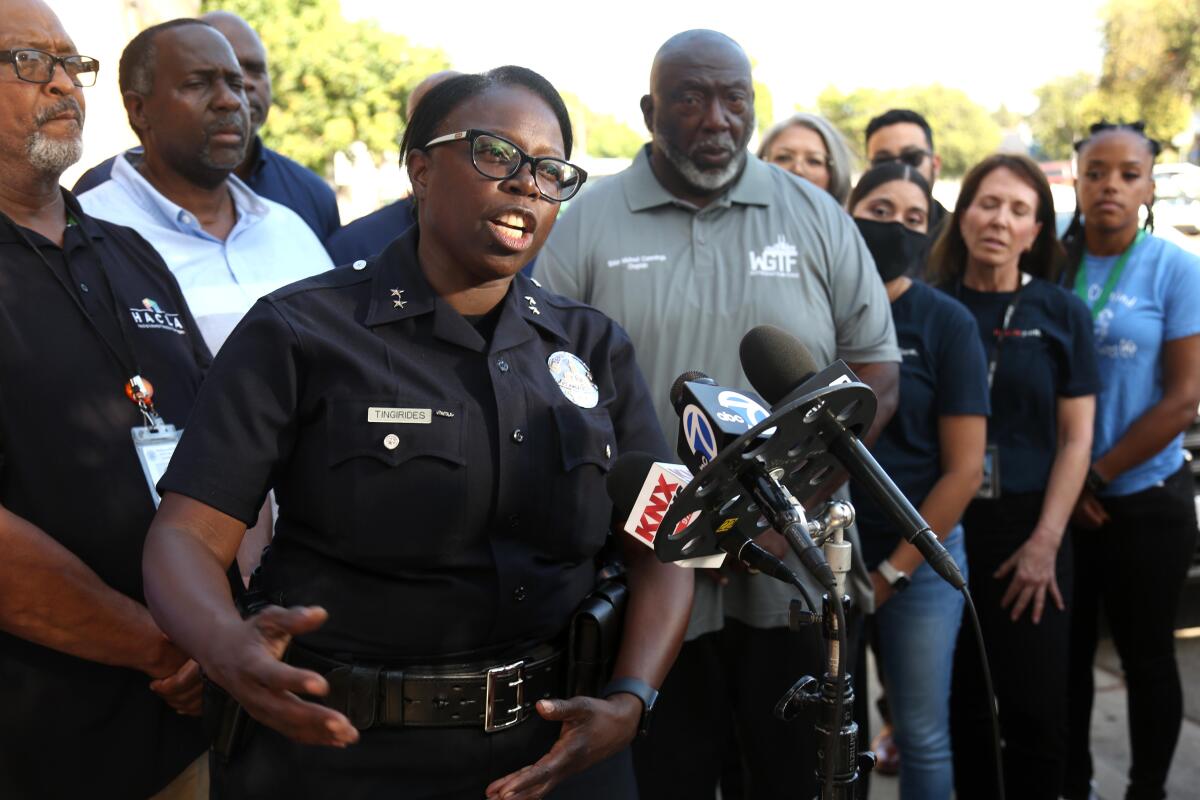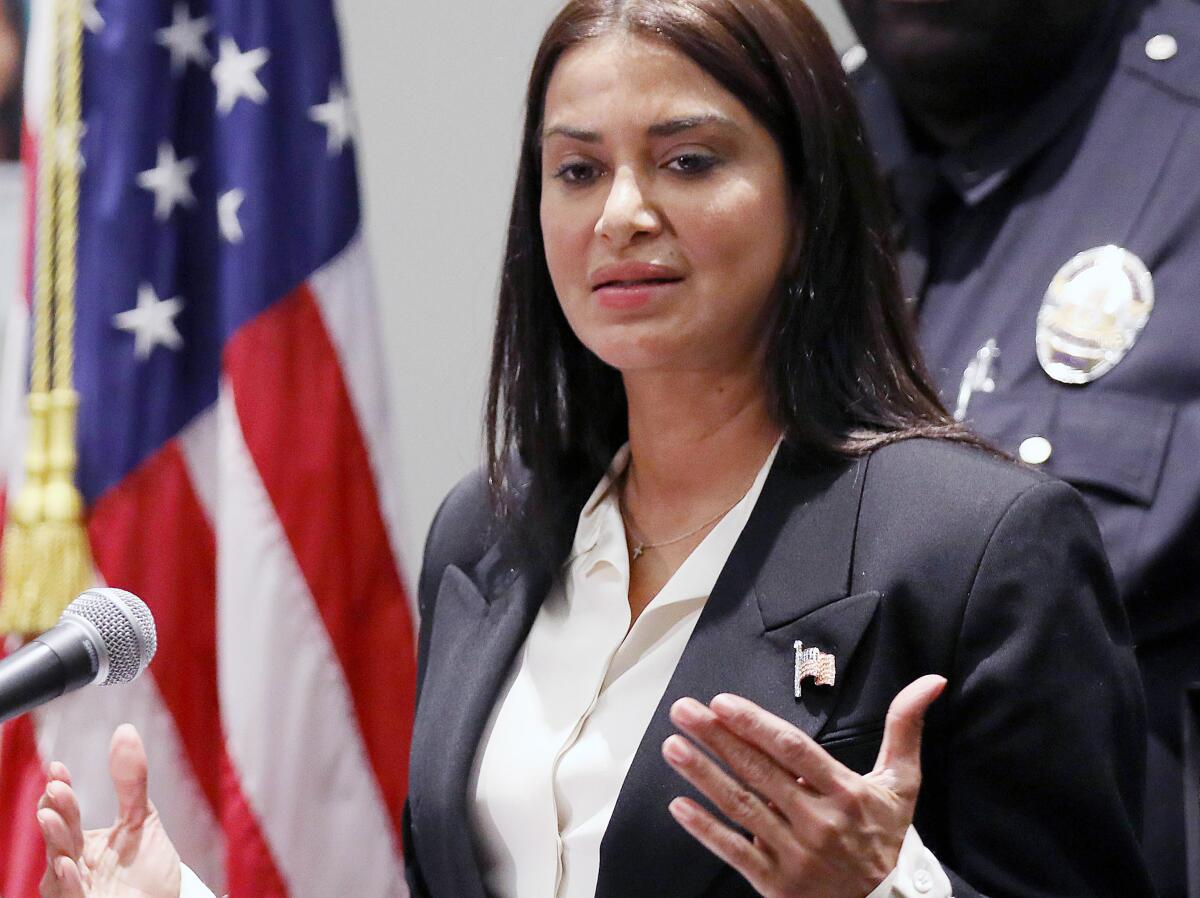LAPD chief candidate field narrows to about 10, a mix of outsiders and insiders

- Share via
After an initial round of interviews, the number of contenders to be the next Los Angeles police chief has been narrowed to about 10 names, according to multiple sources familiar with the nationwide search.
The pared-down list is divided between department veterans and outsiders, including several who have deep ties to Southern California law enforcement.

Among them is Jim McDonnell, a one-time LAPD assistant chief and former Los Angeles County Sheriff, whose name has circulated around LAPD headquarters and City Hall for months as a possible candidate. His entry, confirmed by at least three sources, adds another dynamic into what is considered by many to be a wide-open race to be the city’s next top cop.
The sources agreed to speak to The Times on the condition their names not be used because the search process is supposed to be confidential.
The department veterans who received second interviews, according to sources, are: Assistant Chief Blake Chow, who oversees LAPD special operations; Deputy Chief Emada Tingirides, commanding officer of the department’s South Bureau; Deputy Chief Donald Graham, who heads the Transit Services Bureau; Deputy Chief Alan Hamilton, head of the Detective Bureau; and Cmdr. Lillian Carranza of the Central Bureau.



The outside candidates who are also scheduled to be interviewed are former Houston and Miami chief Art Acevedo and Robert Arcos, a former LAPD assistant chief who works for the Los Angeles County district attorney’s office. Two female policing executives from outside agencies are also said to have received second interviews.


Recruiters are scheduled to conduct another round of interviews with the 10 or so contenders behind closed doors over the next few weeks, according to the sources.
The process has been shrouded in an unusual level of secrecy.
Although the names of candidates have occasionally been withheld to protect the identities of those working in other cities, officials this time have also declined to reveal how many people applied for the position, only saying that the number was “more than 25.” Sources have since told The Times that the number was more than 30.
At stake is the chance to lead the country’s third-largest local police force at a crucial time in its history. Whoever gets the job will be inheriting a wary department eager for clear leadership and a city worried about both crime and the use of force.
One of the key questions facing Mayor Karen Bass is whether an outsider would be better at introducing reforms in the organization, rather than someone who has come up through the ranks here and already understands the political and labor landscape.
Bass and members of the Los Angeles Board of Police Commissioners have embarked on a citywide listening tour to canvass residents, officers and business owners about what they want to see in the next chief. During the public forums, many attendees pushed for the selection of an insider who is attuned to policing in a city as vast and diverse as L.A.
Others talked about the importance of picking someone who understands the complicated history between the department and the communities it policies. And yet, unlike in other recent chief searches, a growing number of people within the LAPD are pushing for an outside candidate to breathe new life into the organization.
The Los Angeles Police Protective League, the powerful bargaining body for the city’s rank-and-file officers, has not publicly staked out its position on the insider-outsider debate.
The search began with the February retirement of former Chief Michel Moore. One of his former assistant chiefs, Dominic Choi, was picked as interim leader. Moore has stayed on as a consultant on the chief’s search, and Choi has said he will not seek the job permanently.
More risk management than crime-fighting, the job of running the LAPD — a vast, multibillion-dollar organization with more than 10,000 employees that operates under an intense microscope — involves balancing demands that are often at odds: Violent crime such as homicides and robberies are up from this time last year; the number of police shootings has also increased, raising concerns from the Police Commission, the department’s civilian watchdog. Meanwhile, any new leader, particularly one from the outside, will be expected to be a quick study and hit the ground running.
The pool of contenders is more diverse and generally less experienced than in the recent past. At least four women are rumored to have made the cut, and all but two candidates are people of color. A woman has never been in charge in the LAPD’s long history. Nor has there ever been a Latino chief, in a city and department that are both now more than half Latino.
Commission officials have insisted publicly that race and gender will not be deciding factors in the selection process. Commission President Erroll G. Southers and the body’s other members have repeatedly said they are focused on picking the most qualified candidate instead of “checking any boxes.”
Southers declined to comment through a spokesperson.
Prognosticators have said Bass’ selection will say a lot about what direction she thinks the department is headed. Picking someone from within the organization to follow in Moore’s footsteps would signal that the mayor is looking to continue some of the reforms he started but would stop short of the wholesale changes that some have called for.
Choosing an outside candidate would signal that the mayor is seeking a new direction for the department, some observers say. The city has hired only two outside chiefs in the past 75 years: Willie L. Williams and William J. Bratton. Both selections followed seismic scandals: the Los Angeles uprising in 1992 and the Rampart scandal of the late 1990s that saw more than 70 police officers implicated in unprovoked shootings, assaults and evidence-planting.
The two current contenders with the most experience are both outsiders. After starting his career with the LAPD, McDonnell left to take the police chief job in Long Beach before a successful run for L.A. County Sheriff. He has worked at USC for the past few years, alongside Southers. Acevedo once served as California Highway Patrol chief for the Los Angeles Basin, before being tapped to be top cop for Austin, Houston, Miami and, most recently, Aurora, Colo.
The second round of interviews marks a key step in the months-long search. City officials initially said the hire would be finalized by late August or early September, but that timeline could stretch into the fall.
Bass will hire the next chief, choosing from nominees provided by the commission and an outside hiring firm. The deadline to apply closed late last month; initial interviews with candidates started a few days later.
Bass has repeatedly said that the feedback she receives will factor into her decision.
City Councilmember Tim McOsker said he understands the need for discretion around the search process, much like when, as a chief of staff for former mayor James Hahn, he took part in the nationwide search that led to the hiring of Bratton. At the same time, he said, he thinks it’s important that Bass lays out her expectations before picking a chief, which is “one of the most important, and politically loaded decisions for a mayor.”
He pointed to the letter Bass sent the Council before her reappointment of Moore, in which she listed her expectations, from reducing violent crime to boosting community policing and holding officers accountable. McOsker said he thought the mayor should be equally clear about what she wants in the next chief.
The mayor’s office didn’t immediately respond to a request for comment on Friday.
LAPD Deputy Chief John McMahon, who runs the Information Technology Bureau, said that, to succeed, the department’s next leader “must truly be competent and actually care to make a difference.”
“The LAPD chief’s job is for someone possibly so very confident and a bit narcissistic they enjoy the abuse, but do they realize the demand,” said McMahon, who didn’t apply for the position.
Experts say the LAPD job is one of the toughest in law enforcement.
Any serious candidate will have to have a proven track record as an experienced leader. The chief must be comfortable speaking extemporaneously — and often in front of cameras — about the work of the police department through the progressive lens of the city’s elected leaders, including the mayor and City Council.
Whoever gets the job will need to navigate through many challenges at once, while dealing with the myriad issues confronting the city, including homelessness and the fentanyl crisis.
The next chief will also have to recruit and inspire a new generation of officers, some of whom weren’t even born when the department was forced to undergo sweeping changes in the wake of the Rampart scandal and who grew of age in the Black Lives Matter era. Others are keen to see how the next chief will tackle a much-maligned discipline system that, depending on whom one asks, either lets too many bad cops off or has been weaponized to favor the well-connected.
More to Read
Sign up for Essential California
The most important California stories and recommendations in your inbox every morning.
You may occasionally receive promotional content from the Los Angeles Times.












